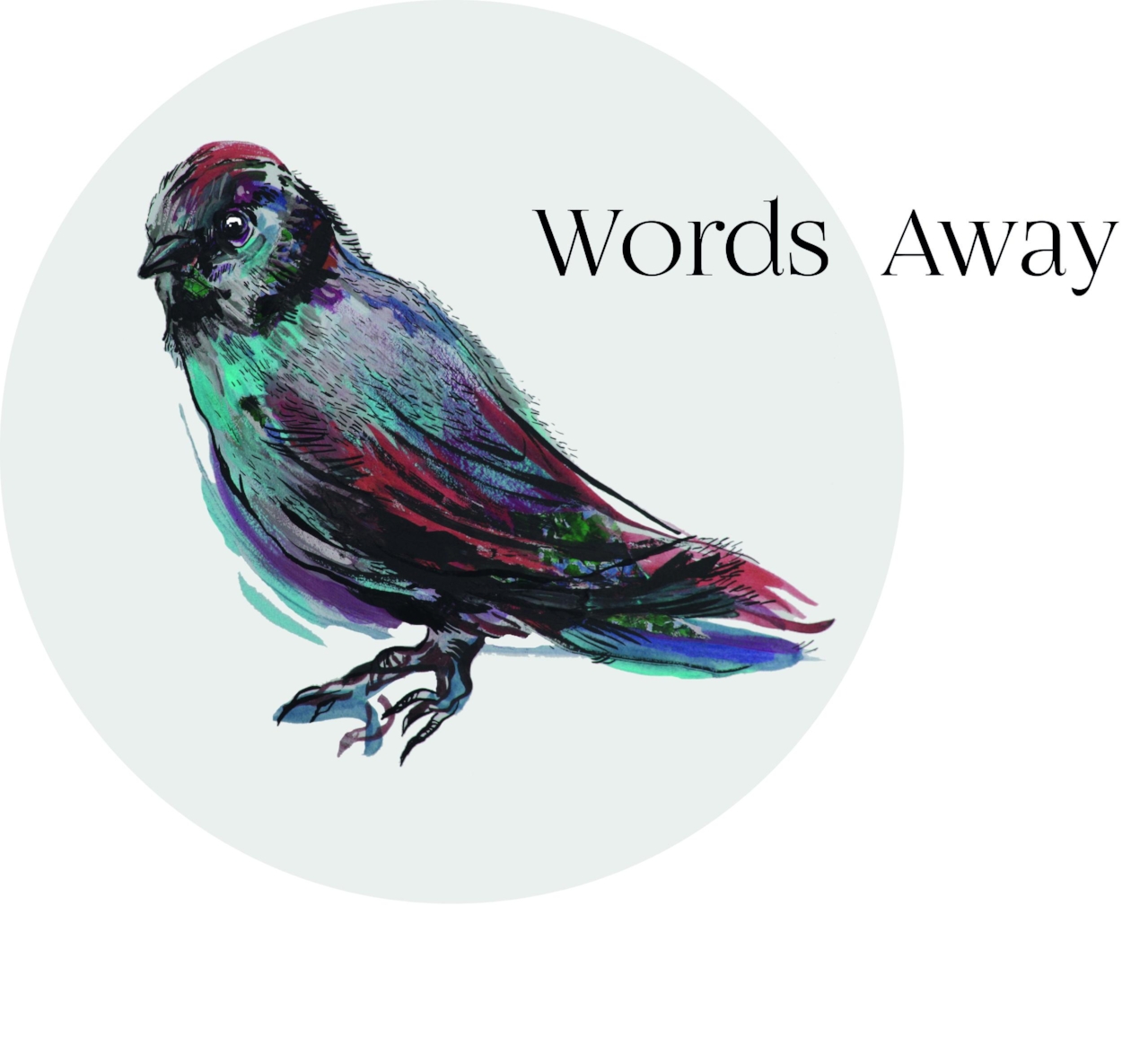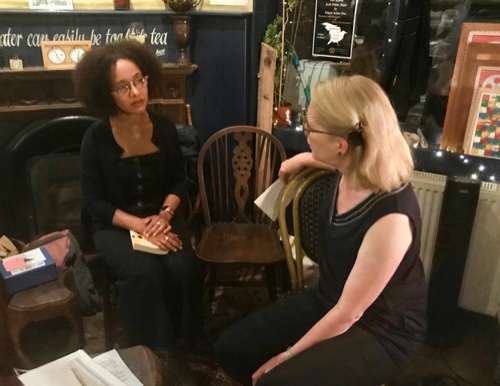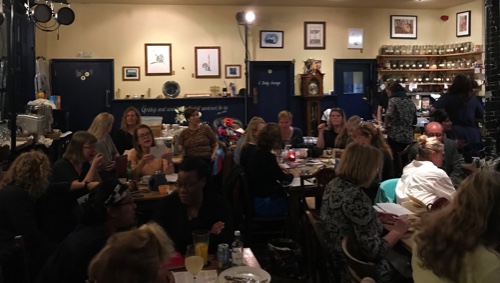The autumn season of Words Away launched last month with a sell-out salon, Identity and Belonging: Writing Character and Place, with guest Diana Evans, author of the award-winning novel, Ordinary People. It was a thrill to welcome everybody and begin a new year of events not least because it also happened to be our third birthday! Diana talked about her process as a novelist, what inspires her to write and also shared some ideas to apply to our own writing practice.
L-R: With Emma Darwin & Diana Evans
Diana’s three novels, 26a, The Wonder and Ordinary People, explore a multiplicity of themes around identity and place. We wondered how she developed an idea into a novel. An obvious source of inspiration, she said, is the lack of people from her community, “people like me”, represented in novels. There’s still work to be done and a void to fill. With Ordinary People, Diana set out to write a portrait of black middle class life and address ordinary themes. She didn’t want to place black characters in the context of the usual negative pathologised themes around blackness, such as criminality, racism, or injustice and slavery. Instead, she created a space for black characters to think about ordinary things and to grapple with their own tortured psychologies. She was inspired by reading John Updike, Richard Yates and James Salter who wrote middle-class American novels about marriage, relationships and the breakdown of family life. Diana wanted to explore this terrain but in the context of British characters while using London as a canvas. The novels of Updike, Yates and Salter however are lacking in female empathy and psychology. Diana wanted to address this lack and honour both points of view by observing the way men and women communicate and respond to each other.
Diana reading an an extract from Ordinary People
Diana weaves cultural icons and global events into the fabric of her novels and places them in personal local terms. She uses political and culturally significant moments to ground her characters in the real world, for example, the election and inauguration of US president Barack Obama, the death of singer Michael Jackson and the wedding of Diana Spencer to Prince Charles. By placing the universal in the local, Diana can see the shape of the story and it helps her to form the physical structure of the novel.
We talked about Diana’s process. First she lists the possible scenes for the novel: the first draft stage is like throwing paint at the wall. Then she writes the scene that she feels the most emotionally connected to - it’s the emotion that give the writing fire and life. Once she has a body of disparate scenes she selects and arranges them in a logical order like steeping stones and then rewrites in a linear way. For building character she suggests brainstorming your character (in terms of their history, physicality and psychology). Think of their ‘Golden Moment’ - a moment in their lives where something changed - the most intense thing that ever happened to them. Establish that moment then write it as a scene. These moments often end up in Diana’s finished product. If you can capture and dramatise your character at a point of extreme emotional change or tension then you have a palpable expression of your character. We touched on ideas like free writing to get in the mood and find focus. You don’t always have to be at the desk to be working - try doing the washing up - the flowing of water can stimulate lots of ideas!
Dialogue Tips: writing accents and dialects
You don’t have to say everything in a conversation between characters on the page.
Only say what actually needs to be said - make jumps through a conversation (for a masterclass in dialogue read F. Scott Fitzgerald’s, Tender Is the Night).
Less is more.
Textual speech is not the same as spoken language.
There should be an element of mystery or a certain spark in dialogue - it should be intrinsically interesting.
You can convey a dialect or accent by missing out certain words or mentioning something about a way a character is speaking peppered through the text occasionally.
The writer’s responsibility, said Diana, is to tell an entertaining story and not be boring! Hopefully we can make people see different lives and other viewpoints. Writing is a solitary practice as you’re on your own a lot. Try to make it as exciting and entertaining for yourself as you can, whether that’s exploring the supernatural or finding the humour in everyday life. If it makes you laugh then hopefully it will make the reader laugh. Fully inhabit your characters. Show the reader what the character’s feeling and how they respond to things. Part of the joy of fiction is to travel through other people’s points of view different to our own. For Diana every novel brings its own challenges and feels like climbing a mountain. The difference now, as opposed to the beginning of a career, is that having finished and published three novels, she knows that writing a novel is possible.
With big thanks to Diana Evans for her warmth and candour, and to Emma Darwin and our lovely audience too for a superb conversation!
Please join us next Monday evening 14th October for more writing insight, Psychological Thrillers: creating dark and addictive fiction with guest author Paul Burston and co-host Caroline Green. On November 4th Emma Darwin will be back with me to discuss, Being Edited and Being Published with Little, Brown/Abacus MD, Richard Beswick and then on 2nd December, Writing Humour in Fiction with Ayisha Malik. While I’m here - we have a couple of spaces left on our forthcoming workshops (both featuring amazing special guests) at The London Bridge Hive: 9th November, Finding Your Fire: A Four Elements workshop on writing and creativity led by Andrew Wille and November 30th, Creating a Scene: a masterclass with Alice Jolly. Hope to cross paths soon!
Best wishes,
Kellie
References:
Diana Evans, Emma Darwin, John Updike, Richard Yates, James Salter, War and Peace by Leo Tolstoy, The Writer’s Book of Days by Judy Reeves: for writing prompts and ideas to get going. Becoming a Writer by Dorothea Brande, Anne Tyler, Ruth Ware, Blake Morrison on the cost of quoting lyrics, Tender Is the Night by F. Scott Fitzgerald








